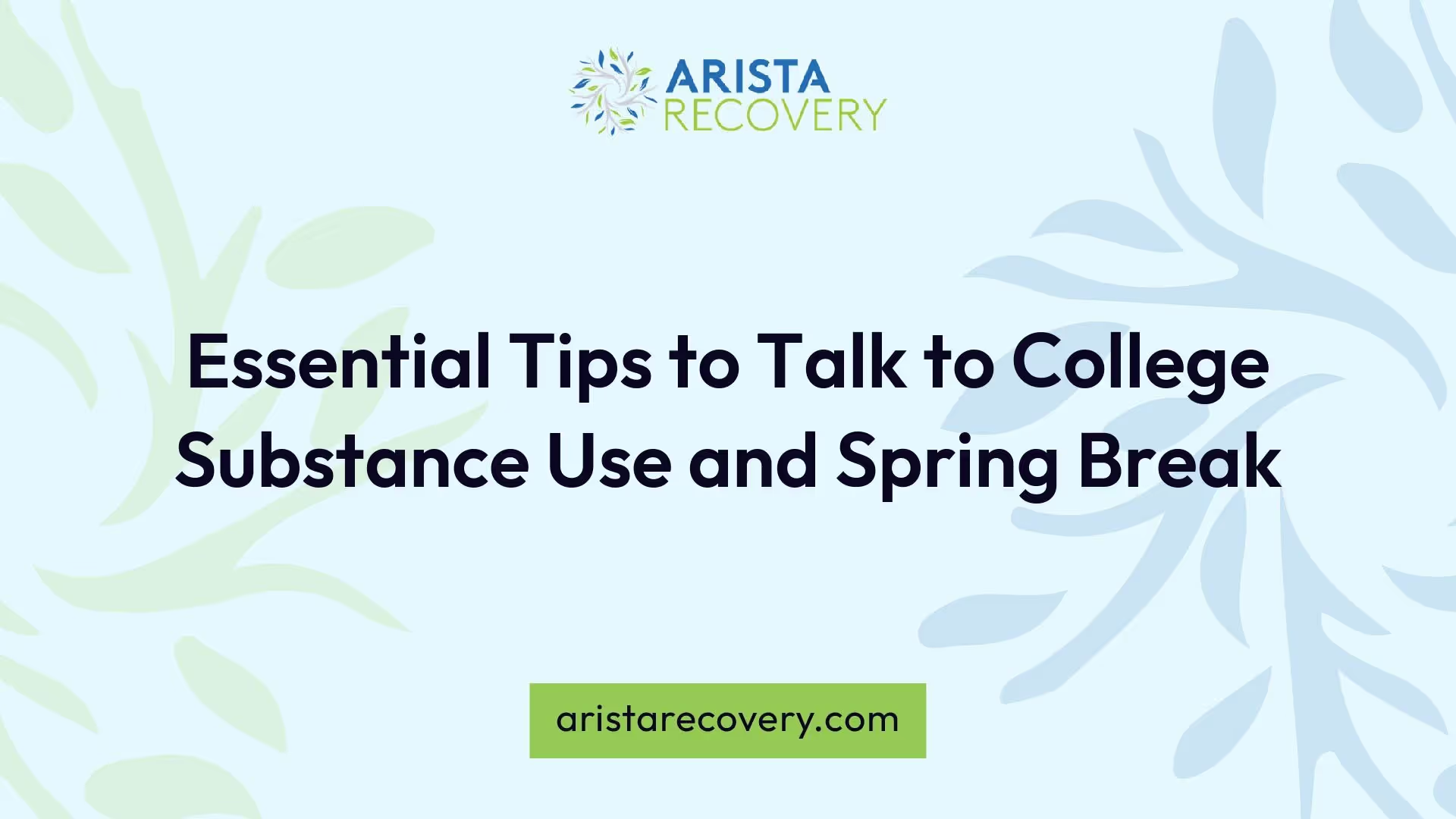
Essential Tips to Talk to College Substance Use and Spring Break
Understanding Substance Use Risks
Keeping a student safe during spring break means being aware of the substances that might come into play and the reasons why they could choose to use them.

Risks During Spring Break
Spring break can feel like a free-for-all where booze and drugs are just part of the scenery. Many college students find themselves in social circles that might push risky choices. Here's what could go wrong:
- Impaired Judgment: Booze and drugs don't just make you laugh at bad jokes; they mess up your ability to think straight, leading to poor decisions.
- Accidents and Injuries: More partying means more chances to trip over your flip-flops or get into fender-benders.
- Legal Troubles: Underage drinking or illegal drugs can land students in a heap of legal mess, jeopardizing their future.
- Academic Performance: When substance use takes the spotlight, grades take a nosedive as focus and motivation disappear.
Knowing these risks is crucial for parents chatting with their kids about substance use. Check out more about how partying can lead to problems in our article on the impact of March Madness on addiction.
Factors Influencing Substance Use
Here's the scoop on why college students might get into substances during spring break:
Recognizing these factors helps parents have heart-to-hearts with their kids about substance use. Chatting about the potential fallout of partying during spring break preps students for what's ahead. For extra tips on guiding your kids away from drugs, consider checking out five ways to protect your child from drugs.
Such conversations can raise awareness and arm students with what they need to stand strong against peer pressure and make smart choices.
Recognizing Signs of Concern
Spotting signs that might hint at substance use among college students is crucial. Being on the lookout lets us catch issues early and get help if needed. Often, these signs pop up through changes in how they act and look.
Behavioral Changes
Behavioral shifts can tip you off to substance use. When a college kid starts acting different, it might mean they're battling addiction or misuse. Here's what to watch for:
Keeping an eye on these shifts matters because they can mess with a student’s well-being.
Physical Appearance Cues
How students look can also give away substance use issues. Changes in appearance might tell a story. Here’s what you might notice:
These clues can be a big help to folks worried about a student’s choices around substances.
Spotting both behavior and appearance changes makes it easier to talk about substance use and the risks involved. For some straight-up advice on handling these chats, check out impact of march madness on addiction.
Addressing Substance Use Concerns
Let's be real for a second, talking about substance use is like trying to French braid a squirrel's tail. With college students, it's all about keeping it chill and open. You turn up with some cool alternatives and heartfelt support, and you sorta set the stage for them to make ace choices while having a proper chinwag about the stuff that matters.
Providing Alternative Activities
Think about it - if you're busy blazing through a mountain trail or bossing a board game night, you've got less time to worry about keg stands. Alternative activities are like the secret sauce to keeping students grounded and off the boozy merry-go-round. Just toss out a few awesome ideas: how about group hikes or a wild movie marathon? Get into gaming tournaments that ain't just a digital anarchy but a sober blast with your mates. Sharing these epic experiences? That's friendship magic without a drop of alcohol.
These activities sidestep the temptation and toss friendships and hobbies into the mix. Ping students about partying without popping bottles or puffing—arm them with some good ol' common sense.
Expressing Emotional Support
Here's the lowdown: getting deep with students about substance is some trunk-to-tail bonding. The endgame? They vibe on knowing someone's always got their six. When you're listening without going all judgy, it's kinda like slipping into a pair of comfy old jeans—students'll open up, no sweat.
Set some smart boundaries. It's key. Parents and guardians, drop that knowledge bomb about real-world consequences of substance slip-ups, especially when you're jetting across borders. The laws ain't the same everywhere, and a sip here and a puff there can morph into something major league bad [3].
Oh, and don't skimp on boosting the kids' confidence! Give them those ninja skills to say "Nah, mate" with oomph. Remind them it’s cool to be who they are without caving into every dare out there. It's about wrapping them in a cocoon of trust, so they're comfy making choices true to themselves [1].
Educating About Substance Use
Grasping the impact of experimenting with drugs and alcohol really hits home—it's especially crucial for college crowd as they dive headfirst into spring break. This section spills the beans on what happens when you partake and stresses why clear, truthful information is a lifesaver.
Consequences of Substance Use
When college students get caught up in the cycle of drug or alcohol abuse, it can flip their lives upside down in both the here-and-now and far into their future. It’s essential to understand how these choices trickle into more than just a hangover.
Chatting about these risks with your college kid can go a long way in keeping them safe [2]. In the short run, poor decisions lead to risky shenanigans, possible injuries, and slumping grades. Looking down the road, the grip of addiction can take hold, which basically drags you into repeated drug use despite the mounds of trouble it causes.
Sharing Accurate Information
Let's keep it real—spouting off solid facts about the traps of substance use is your go-to. What should you lay out on the table?
- Messy judgment can lead to foolhardy choices and legal headaches
- Not-so-pretty academic repercussions when things go off the rails
- Real stats and stories putting the seriousness of substance abuse into glaring focus (get the scoop)
It’s also key for parents and teachers to put a spotlight on how stuff like marijuana might nudge students towards flunking out, and up the ante on crummy choices. Interested? Look into marijuana use and college dropouts. Sharing this wisdom opens students' eyes wide and helps them brace for smarter choices during all the ups and downs of college life.
Putting everything on the table and having these candid convos give college students the knowledge to steer their lives away from the chaos brought on by questionable decisions—it’s all about making sure they’re lining up healthier, brighter futures.
Supporting College Students
Helping college students deal with substance use, especially during those wild spring break weeks, calls for a down-to-earth, relatable approach. When students feel they can chat about their wild days and stressors without getting the stink eye, you know you're doing something right.
Emotional Support Strategies
Let’s get real. Emotional support is more than half the battle when it comes to coaching students through the party scene's pressures. When parents and mentors stand in their corner, students feel safer opening up about spring break shenanigans and the temptations that come with it. Here are some tried-and-true ways to lend a hand:
- Active Listening: Channel your inner Oprah and listen up without jumping in to judge. Feeling heard can nudge students to spill the beans about their thoughts and adventures (or misadventures) tied to substance use.
- Open Communication: Keep the conversation flowing about the whole buzz around substance use, its upsides and downsides included. You know there’s peer pressure and a tidal wave of booze and drugs heading into spring break. Arm them with stories, strategies, and straight-up facts for making the smart moves.
- Alternative Activities: Why let kegs get all the fun? Encourage the college crew to hit up events that don’t center around bottles and blunts. Get involved in activities that serve up good times and friendships minus the hangover [1].
Creating Safe Communication Spaces
You gotta make it feel cozy for students to speak their piece without worrying much, allowing for discussions as smooth as a Sunday morning. Want to know how? Read on:
- Non-Traditional Settings: Forget the stiff settings. Grab a latte at a chill coffee joint or chat during a laid-back hike. These casual environments help serious talks feel less like interrogations and more like heart-to-hearts.
- Encouraging Awareness: Talk up the peer pressure beast and those lax vacation weeks that tempt students to act out. Help them think through these triggers so they’re ready to face them head-on when spring break hits.
- Educational Opportunities: Arm them with the 411 on substance risks. Gone are the days of lectures—now you empower them with info on what downing shots could really mean. Educate them so they stay smart when the party lights flash [1].
By mixing solid emotional support and open spaces to chat, we’re setting college students up for wiser choices during spring break and later. Tackle substance use before it starts dominating, thus building bridges and accountability. And if your kid is a sports fan, check out the impact of March Madness on addiction to see how hype can twist behavior.
Promoting Healthy Choices
Making sure college students are opting for healthy choices when it comes to substances is about more than just wagging a finger—it's about giving them the tools to make smart decisions. This means having open chats and helping them build up their decision-making muscles.
Encouraging Open Conversations
Having heart-to-hearts about substance use can really open up the floor for college students to learn and understand the stakes. These chats let them deal with peer pressure and dodge dicey situations. It's super important for parents to lay down the law about what they expect with substance use, highlighting safety and wellbeing. This way, students have a comfy zone to spill their thoughts and worries.
Using these moments for emotional bonding can really crank up the quality of the conversation and make a positive impact.
Equipping with Decision-Making Tools
To stand tall against peer pressure, college students need some solid decision-making skills. Showing them how to be assertive can do wonders—they'll learn to say no without guilt-trips and make picks that fit their values. Things like sticking up for themselves, brainstorming fun without substances, and setting clear personal rules are gold.
With these skills in their toolkit, students won't just walk taller—they'll be way better at sidestepping risky business [1]. By keeping the conversation going and adding these decision-making tricks to their arsenal, parents and mentors can nudge students toward picking healthier routes during spring break and beyond.
References
[2]: https://www.wellbrookrecovery.com/post/discuss-substance-abuse-for-spring-break
[3]: https://www.socialrecoverycenter.com/blog/tips-to-talk-to-your-college-kid-about-substance-use-and-spring-break
[4]: https://www.newhorizonscenters.com/blog/talk-to-your-college-kid-about-substance-abuse
When mental health challenges and addiction intersect, it can feel isolating. At Arista, we offer compassionate, evidence-based, and trauma-informed care to help you heal, grow, and move forward.
You’re not alone in this.
When mental health challenges and addiction intersect, it can feel isolating. At Arista, we offer compassionate, evidence-based, and trauma-informed care to help you heal, grow, and move forward.
Support that moves with you.
You’ve taken a brave first step. At Arista Recovery, we’re here to help you continue with best-in-class care designed for long-term healing and support.
.webp)






